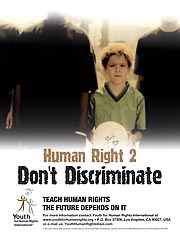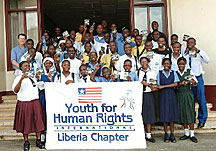|
Youth for Human Rights: Forging a Bridge of Understanding and Tolerance
March 26, 2007
Despite all our resources in the 21st Century, as you read these words, some 20 armed conflicts are being waged on Earth.
According to U.S. government estimates, between 600,000 and 800,000 men, women, and children are trafficked across international borders each year, with millions more forced, duped, or coerced into slavery within their own borders.
Of all the rights laid out in the Universal Declaration of Human Rights, war and slavery are likely the worst violations, yet they are still with us, despite the Universal Declaration's endorsement by the entire United Nations General Assembly, 58 years ago in 1948.
It is the firm belief of Youth for Human Rights International that education is the key to making these rights a reality for everyone. And to accomplish this they have created a series of educational materials that appeal to youth of all nations and are simple enough to convey the meaning of each of the 30 articles of the Universal Declaration of Human Rights. One example is the booklet Know Your Human Rights.
Each time this booklet is translated into a new language it enables these concepts to permeate a whole new segment of our global community. Which is why Youth for Human Rights International is so happy to announce the translation of Know Your Human Rights into two new languages: Serbian and Esperanto.
Human rights violations were at the root of the Balkan conflicts of the 1990s, which cost hundreds of thousand of lives and left more than a million homeless. So the translation of Know Your Human Rights into Serbian is a milestone, as with human rights education we can prevent such a cataclysm from ever occurring again.
It is also fitting that this human rights booklet has been translated into Esperanto, a truly international language. Not limited to the geographic borders of any nation, and incorporating aspects of many different languages, the very purpose of Esperanto is peace through equality and tolerance among peoples.
American author and humanitarian, L. Ron Hubbard, once wrote, "On the day we can fully trust each other there will be peace on earth." Through understanding and honoring the human rights of others, this level of trust can be accomplished.
|




